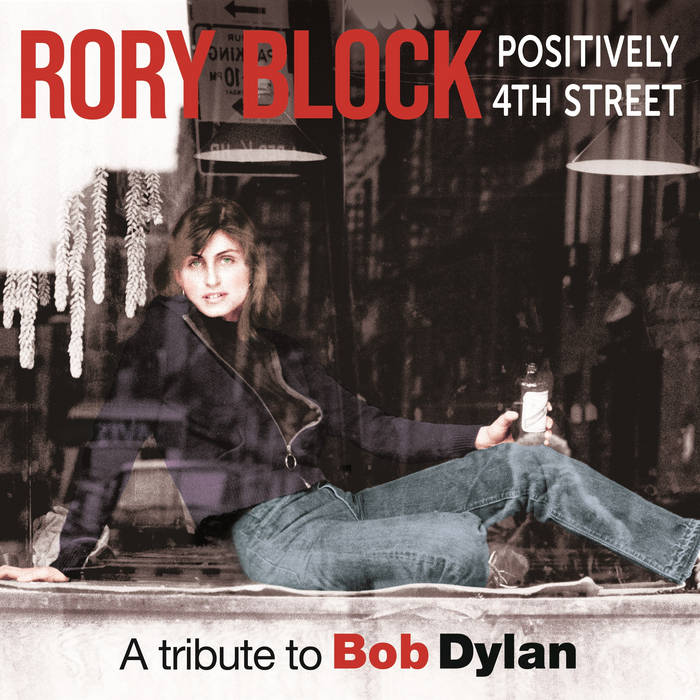Rory Block has recorded 31 albums over more than half a century. She is one of the finest, if not the finest, acoustic blues guitarist advancing the style of artists like Son House, Robert Johnson, and Mississippi John Hurt, but she’s adventurous enough to take left turns as in Ain’t Nobody Worried where she covers songs by female pop artists. She has just released Positively 4th Street – A Tribute to Bob Dylan.

Rory’s favorite song on Positively 4th St. is “Like A Rolling Stone,” an ode to Miss Lonely, “a complete unknown with “no direction home” and “no secrets to conceal.” He might as well have been speaking about a tweenage Rory. Also included are “Positively 4th St.,” “A Hard Rain’s Gonna Fall,” “Everything Is Broken,” “Ring Them Bells.” “Not Dark Yet,” “Mother of Muses” and “Murder Most Foul.”
Rory and I have been friends and colleagues for 53 years. I don’t “interview” her. She calls me as often as I call her, and we compare notes. When she called me many months ago to ask my opinion of her doing the tribute I almost jumped through the phone with anticipation.
She knew Dylan when he was an unsigned folk singer living around the block from her in Greenwich Village. She sees him from an early teen’s personal perspective unlike that of any other living musician who’s covered his work. In the early ’60s Dylan explored “the direction home” for baby boomers like me who until then were defined simply as the offspring of postwar parents who survived the grey Eisenhower era of the ’50s, a time when popular music had morphed from “How Much is That Doggie in the Window” to “Heartbreak Hotel.” The British Invasion changed the paradigm for popular music appealing to baby boomers approaching adulthood, but Dylan’s work defined boomers, especially academics, as different breed anxious to take over the world.
Dylan’s work lives on its own, separate and distinct from its author. Having Rory interpret these songs as a woman who knew him when she was still a tweenager is a unique and fascinating journey into arguably the best songwriter of the last 60 years executed by a woman who is arguably the best acoustic guitarist of either gender. The result, Positively 4th St., is a one plus one equaling two to the nth power, a truly mature expression suitable for the 21st century.

Below is an edited transcript of our conversation about her Dylan tribute.
Rory’s words:
Dylan lived two doors from my dad’s sandal shop for a period of time in an apartment. He was one of the Village regulars. You would see him on the street. He was really a local person. I saw him talking to my dad, and my dad said some interesting things that I wrote in the liner notes about that conversation and how Bob Dylan was really interested in the integrity of his art and wasn’t interested at all in the business side of things. He wanted to stay true to his art, and I thought, “Man, that is great.” I was only 12, 13, or 14, and I thought that was an inspiration, and I only felt that way about music and life anyway. So, I felt I resonated with what he was saying.
I thought everybody knew Bob Dylan, not that I knew him personally. I just thought everybody was surrounded by Jimi Hendrix walking up and down the street, John Lennon walking up and down the street which was so cool. I thought everybody was meeting Mississippi John Hurt. I couldn’t compare myself to anybody, but I know there were people having a different life than I was having, but I didn’t know anything about that different life. So, I didn’t have posters on the wall. I wasn’t a fan of Elvis Presley even though I think he’s good. I wasn’t part of certain crazes that came and went. I just thought Dylan was singing in an authentic honest voice.
I always thought music had integrity, and you needed not to sell out but to be true to your art, and that was what Bob Dylan was saying to my father. His priority was being true to his art, and I thought I always understood that. I don’t know what anybody else understood at my age or anything about that. I just knew that that was the way music was being presented to me my whole life. It was always about you trying for the best. It had to be real. Don’t do anything fake. Keep it real.
The way he sang, his timing, his emphasis and the way he spoke was like a sermon. When you sing blues there’s always somebody talking in the background. When I listen to the recording of one of his songs, I go, “Man, I should have gotten to be more like he did because he really nailed it.” If he didn’t nail it with his vocals, nobody would have loved those songs. The way he nails those songs you probably weren’t even aware of. When I listen to it now, I appreciate it even more; I appreciate the technique of it.Every Dylan song immediately had absolute penetrating insight and hard-hitting truth. That’s the whole thing. He also loved folk music and Woody Guthrie. I didn’t know this about him until recently, and saw that his early records – he knew who Son House was and he had ventured into Robert Johnson, and just in a line about Robert Johnson’s crossroads and then moved on to the next measure and there’s something he said about someone else.
On his first record he says he was coming from a folk background, and so was I. I know about the beautiful sound of Appalachia and that area of the country. The Appalachian mountain singers – Roscoe Holcomb and Charlie Poole, and all these great early country singers had this gritty sound. My dad sang like that. It was really authentic. Really down home, really heartfelt. Dylan sang in that way because he has a background in that, and so did I. I really love his vocals, and I heard some people say something to the contrary, and I really don’t care. I loved his vocals, and obviously a lot of other people loved his vocals or how could he be so famous? I got that he was earthy, and he was coming from the folk, real American background.
The tribute album:
I got the idea for the Dylan tribute from my music at my online broadcasts because I’d put Dylan songs in, and everybody just loved them. “I’d never heard the words before until you sang it.” I was getting the most incredible response from the Dylan songs and repeatedly people would say, “You really have to do a Dylan tribute,” and so that’s how it came up. Rob, my husband and my engineer said, “You definitely should do a Dylan record. There is something going on when you do Dylan songs. It really works.
So, then, I asked Holgar at Stony Plain (Records), and I thought he was going to say, “No, You gotta stay with Power Women of the Blues while you’re on a roll,” but instead he said, “Do it!” I thought, “Wow. Ok.” And then you were gung-ho, and I’m like, this is ok. I’m not worried that people will say, “What’s wrong with Rory Block?” There was so much support from the viewers, from Rob, from you, from Holgar, that I just started. And when I started, I went, Ok, I really love these songs. It feels good to do these songs.
I’ve been playing all the instruments on my albums ever since Rounder Records gave me such minute budgets that I couldn’t afford going into a studio or hiring anyone. So, I started doing all my own background vocals, and it’s become a thing for me. It has this thing to it. It has a certain sound to it. One reviewer said, “You absolutely wouldn’t know that all these instruments were played by Rory. It sounds like she had the coolest little band.” So, that’s fine. I can do all the songs I did on the record in concert with a guitar ’cause that’s the basis of it. On the record I adorned it with some overdubs but not that many, and I keep it simple. I keep it clean.
Conclusion:
I always pick songs that jump out and scream, “Hello. I’m a beautiful song. I’m filled with emotion and beauty and melody and music and energy.” It’s the same thing whether it’s blues, or Bob Dylan, or Koko Taylor. No matter what it is, it has to be a song that leaps out, and I go, “Oh, yeah. That one.” It’s like a chemistry thing.
In retrospect, I would have asked more questions when I was sitting with Son House. I mean I talked about Robert Johnson with him, but I probably would have peppered him with questions. But I tried not to do that because I thought it might be annoying or overwhelming. I just tried to keep it special. So, I didn’t really know so much. Now, in retrospect I go, man, I was so lucky to be in the right place at the right time. Age smiled on me. That was good fortune.

